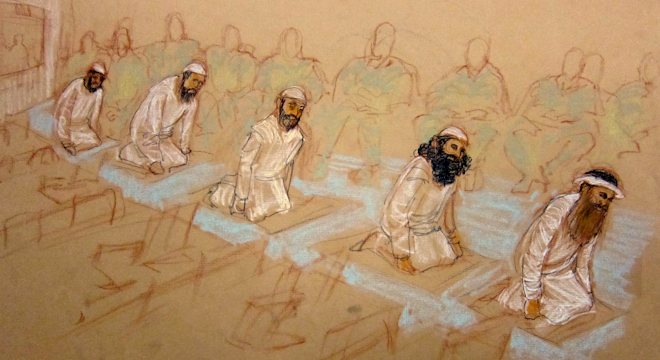For a system whose credibility has long been in dispute, Saturday’s arraignment of Khalid Sheikh Muhammed and his fellow accused 9/11 co-conspirators in front of a military commission at Guantanamo Bay offered little hope that the “trial of the century” has much chance at success.
KSM and his four co-defendants refused to answer during the 13-hour long hearing, removing their headphones so they couldn’t hear the proceedings in Arabic. They took extended prayer breaks, once even in the midst of the arraignment proceeding. One placed a paper airplane on the microphone, two leafed through a copy of The Economist. At another point a defendant compared guards at the base to the late Muammar Qaddafi and suggested the guards might kill them and say they committed suicide.
This wasn’t how things were supposed to go. This arraignment wasn’t even supposed to happen. Saturday’s hearing marked a failure for the Obama administration, which had put a stop to military commissions shortly after Obama took office. Attorney General Eric Holder later announced that KSM and his cohorts would be tried in federal court in New York, a decision that faced stiff political opposition and was ultimately moved back to Guantanamo. The arraignment of Khalid Sheikh Muhammed and his four co-defendants took place just over a year after Holder announced it was moving back to the military system.
But the fact that the U.S. nearly tired KSM and his alleged conspirators in civilian court left many observers with one question as the arraignment dragged on: Would this have happened in federal court?
No way to tell, says Brigadier General Mark Martins, the chief prosecutor at Guantanamo.
“Speculation about what might or might not happen in federal court is at this point, just that: unconfirmable speculation,” Martins said in his opening remarks during an early Sunday morning press conference in the media center at Guantanamo’s Camp Justice.
But observers told TPM that the key difference they saw on display Saturday was the constant need for the military justice system to display its fairness. They say that helps explain why Judge James Pohl put up with as much as he did from defense attorneys for the five accused terrorists.
“My sense is that the judge is less confident than a federal judge would have been and then therefore didn’t control the courtroom the way I would have expected a federal judge to control the courtroom,” Andrew J. Prasow of Human Rights Watch, who watched the proceedings from Fort Meade, told TPM.
“I think he’s probably acting from a reasonable place of awareness that the world is watching this trial, but because the system is so defective, he knows it will be subject to criticism. I don’t think a federal judge has that experience, a federal judge proceeds secure in the knowledge that the legal basis and the jurisdiction underpinning the trial is solid. So he can make appropriate rulings, he can tell lawyers he will deal with the issues they want to raise at an appropriate time and order them to sit down,” Prasow said.
“I have never heard, in the history of civilian prosecutions, of a 13-hour arraignment,” Raha Wala of Human Rights First, who also observed from Fort Meade, told TPM. “I was just shocked that it was going on and on like that. I think it’s a reflection of the uncertainly.”
“There’s no reason that a chief prosecutor has to get up and make PR statements regularly, whether they are in colleges or before bar associations or before you all about how fair the system is because we know [federal court] is,” defense attorney Cheryl Bormann, who wore a full black abaya to court and requested that members of the prosecution team dress more modestly, said at the Sunday morning press conference.
But Benjamin Wittes of the Lawfare blog cautioned against speculation about how a federal judge would have handled questions about his qualifications or procedural questions about the military commission format, pointing out that those questions would never even come up in federal court.
“If you’re accused of crime X and tried in federal district court in Washington, your motion that the federal district court in Washington is not legally constituted is a frivolous document. Attacking the legitimacy of the tribunal is not going to be a feature let alone a central feature of your defense strategy,” Wittes told TPM. That’s not true for the military commissions.
As for the behavior of the defendants, Wittes said various federal judges would have handled that situation in a variety of ways.
“I think Judge Pohl was quite tolerant,” Wittes said. “He clearly wanted to move away from major confrontation. Some federal judges would have clamped down much harder and much faster on the detainees and their lawyers — some of whom were pushing lines. There are judges who say ‘I’m not going to say this again,’ which he said several times, there are judges who start issuing contempt findings at a certain point, and he didn’t.”
“I think he showed the defense a lot of running room in that proceeding,” Wittes said. “I don’t have any doubts that there are certain courts in the country where if defendants and defendants’ lawyers behaved the way these ones did, there may have been repercussions for that which did not materialize.”
Despite the hiccups, the fact that the arraignment was finished in a single day was impressive to some who anticipated it could stretch into two days.
“I suppose we could say it went smoother than some people anticipated,” Jim Harrington, an attorney for Ramzi Binal Shibh, said at Sunday’s press conference. “We got through the whole arraignment process, everybody has counsel now and things are set to progress.”









